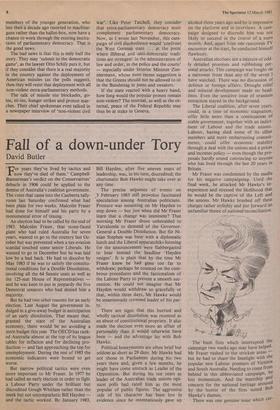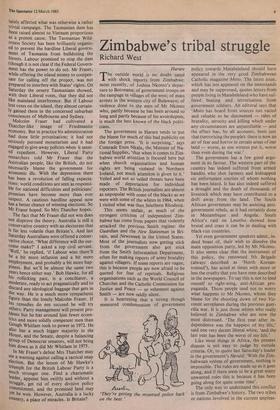Fall of a down-under Tory
David Butler
`Uor years they've lived by tactics and l'now they've died of them.' Campbell- Bannerman's verdict on the Conservatives' debacle in 1906 could be applied to the demise of Australia's coalition government. The votes that came into the Canberra tally- room last Saturday confirmed what had been plain for two weeks. Malcolm Fraser had done for himself and his party by a monumental error of timing.
An election had to be called by the end of 1983. Malcolm Fraser, that stone-faced giant who had ruled Australia for seven years, wanted to go to the country last Oc- tober but was prevented when a tax-evasion scandal touched some senior Liberals. He wanted to go in December but he was laid low by a bad back. He had to dissolve by May 1983 if he was to satisfy the constitu- tional conditions for a Double Dissolution, involving all the 64 Senate seats as well as the 125-seat House of Representatives — and he was keen to put in jeopardy the five Democrat senators who had denied him a majority.
But he had two other reasons for an early election. Last August the government in- dulged in a give-away budget in anticipation of an early dissolution. That meant that, granted the state of the Australian economy, there would be no avoiding a stern budget this year. The OECD has rank- ed Australia almost at the top of its league tables for inflation and for declining pro- duction — and fast approaching the top for unemployment. During the rest of 1983 the economic indicators were bound to get worse.
But narrow political tactics were even more important to Mr Fraser. In 1977 he had called an early election in order to fight a Labour Party under the brilliant but discredited Gough Whitlam rather than the meek but not unsympathetic Bill Hayden and the tactic worked. By January 1983, Bill Hayden, after five uneven years of leadership, was, in his turn, discredited; the charismatic Bob Hawke might take over at any time.
The precise sequence of events on 3 February 1983 still provokes fascinated speculation among Australian politicians. Pressure was mounting on Mr Hayden to step down — but just when did Mr Fraser learn that a change was imminent? That morning Mr Fraser drove unheralded to' Yarralumla to demand of the Governor- General a Double Dissolution. But Sir Ni- nian Stephen was busy with a diplomatic lunch and the Liberal apparatchiks listening for the announcement were flabbergasted to hear instead the headline 'Hayden resigns'. It is plain that by the time Mr Fraser knew he had gone too far to withdraw; perhaps he counted on the cum- brous procedures and the factionalism of the Labour Party to prevent a smooth suc- cession. He could not imagine that Mr Hayden would withdraw so gracefully or that, within three days, Mr Hawke would be unanimously crowned leader of his par- ty.
There are signs that this hurried and wholly tactical dissolution was resented as an abuse of constitutional propriety. It also made the election even more an affair of personality than it would otherwise have been — and the advantage lay with Bob Hawke.
Political honeymoons are often brief but seldom as short as 29 days. Mr Hawke had not shone in Parliament during his two years there and, given a few months, he might have come unstuck as Leader of the Opposition. But during his ten years as leader of the Australian trade unions opi- nion polls had rated him as the most popular of public figures. The aggressive side of his character has been less in evidence since he ostentatiously gave up
alcohol three years ago and he is impressive on the platform and in interviews. A cam- paign designed to discredit him was not likely to succeed in the course of a mere month. And, apart from one rancorous TV encounter at the start, he conducted himself flawlessly.
Australian elections are a mixture of odd- ly detailed promises and rubbishing per- sonal attacks. This campaign was fought on a narrower front than any of the seven I have watched. There was no discussion of defence or foreign affairs. Drought relief and mineral development made no head- lines. Even the sensitive issue of uranium extraction stayed in the background.
The Liberal coalition, after seven years, could, in a time of economic stagnation, offer little more than a continuation of stable government, together with an indict- ment of Labour and the trade unions. Labour, having shed some of its sillier members and more embarrassing commit- ments, could offer economic stability through a deal with the unions and a prices and incomes policy — even though the pro- posals hardly sound convincing to anyone who has lived through the last 20 years in Britain.
Mr Fraser was condemned by the media for his negative campaigning. Until the final week, he attacked Mr Hawke's in- experience and stressed the likelihood that he would be the captive of the Left and the unions. Mr Hawke brushed off these charges rather stylishly and put forward an unfamiliar theme of national reconciliation.
The bush fires which interrupted the campaign two weeks ago may have helped. Mr Fraser rushed to the stricken areas — but he had to share the limelight with the popular new Labour premiers of Victoria and South Australia. Needing to come from behind in this abbreviated campaign, he lost momentum. And the mateship and concern for the national heritage aroused by the horror of the fires suited Bob Hawke's themes.
There was one genuine issue which cer-
tainly affected what was otherwise a rather trivial campaign. The Tasmanian dam has been raised almost to Vietnam proportions as a protest cause. The Tasmanian Wild- erness Society has been brilliantly organis- ed to prevent the hardline Liberal govern- ment of Tasmania from bulldozing the forests. Labour promised to stop the dam (though it is not clear if the Federal Govern- ment has the power to do so). Mr Fraser, while offering the island money to compen- sate for calling off the project, was not prepared to interfere with States' rights. On Saturday the ornery Tasmanians showed, with their Liberal votes, that they did not like mainland interference. But if Labour lost votes on the island, they almost certain- ly gained them in the concerned suburban consciences of Melbourne and Sydney.
Malcolm Fraser had cultivated a Thatcher-like image of Friedmanite economy. But in practice his administration had done little privatisation; it had not seriously pursued monetarism and it had engaged in give-away policies when it seem- ed expedient. However, Liberal Party researchers told Mr Fraser that the Australian people, like the British, do not necessarily blame the government for economic ills. With the depression there has been a revolution of falling expecta- tions: world conditions are seen as responsi- ble for national difficulties and politicians' promises have become more than ever suspect. A cautious hardline appeal now has a better chance of winning elections. So Mr Fraser hoped. So Mrs Thatcher hopes.
The fact that Mr Fraser did not win does not disprove the theory. Australia is still a conservative country with an electorate that is far less volatile than Britain's. And last Saturday Australians were offered a conser- vative choice. 'What difference will the out- come make?' I asked a top civil servant. `Well,' he replied, 'if Labour wins there'll be a bit more inflation and a bit more employment, and probably a bit more hap- Mess. But we'll be almost the same two Years hence either way.' Bob Hawke, for all his rollicking past, is a conciliator, a moderate, ready to act pragmatically and to discard any ideological baggage that gets in the way. He is a much more sympathetic figure than the lonely Malcolm Fraser. If his remedies do not succeed he will try Others. Party management will present pro- blems but he has around him fewer eccen- trics and more solidly competent men than Cough Whitlam took to power in 1972. He also has a much bigger majority in the House, and the Senate, despite a balancing group of Democrat senators, will not bring him down as it did Mr Whitlam in 1975.
In Mr Fraser's defeat Mrs Thatcher may see a warning against calling a tactical snap election. But the lesson of Mr Hawke's triumph for the British Labour Party is a much stronger one. Find a charismatic leader, appoint him swiftly and without a struggle, get rid of every divisive policy commitment, and the promised land may Yet be won. However, Australia is a lucky country, a place of miracles. Is Britain?











































 Previous page
Previous page